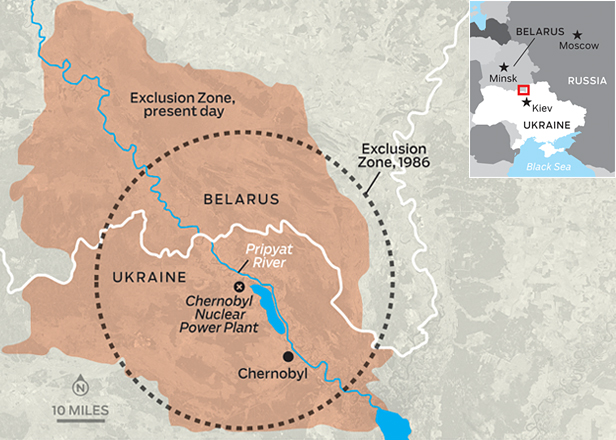Chernobyl is the worlds largest nuclear accident. It occurred on April 26, 1986. It started when the plants #4 reactor exploded violently. Many people were killed because of the harmful radiation that was emitted, and large swaths of land around the town were deemed unsafe to live in. However, there were other consequences, both good and bad, besides the immediate loss of life.
One major effect, was the uprooting of hundreds of thousands of people essentially overnight. Because the harmful radioactive dust was spreading and contaminating the land people were forced to leave immediately. Roughly 116,000 people were relocated from a 30km zone around the site. New steps to alleviate the impact of Chernobyl have been put into place, and it is hoped by 2020 people can begin to return with minimal restrictions.

This Picture shows the modern day vs. 1986 exclusion zones.
—– : (This will take you to a National Geographic Documentary on the Wildlife in the Exclusion Zone)
A second consequence was it strengthened Gorbachev’s resolve to reverse the nuclear arms race. (Freeze 457) He stated that; “We learned what nuclear war can be”. (Freeze 457) This event combined with others greatly aided the reduction of the nuclear arms race. The Soviets went from nuclear parity, to nuclear sufficiency. After realizing what nuclear war could be like, Gorbachev’s foreign policy greatly changed. He told his people that they could not be drawn into prolonged arms races, that they may not win.
——- This documnt is the “Proposal on the Expiration of the Unilateral Soviet Moratorium on Nuclear Testing”. It shows that while the Soviets would continue testing, they were willing to step to the table for talks with the US.
Another consequence was that the policy of glasnost was fully put to the test. Until this moment it had been merely a slogan of the government. Now it became practice. This term refers to a policy of a more open government, and of the sharing of information. While to Soviet Government was slow to respond globally at first, once they did they allowed for medias from many nations to cover it. Uncharacteristically, the Soviet Union also welcomed outside help from other nations in aiding those who had been displace, as well as exploring the consequences.

While these are just some of the consequences of this disaster there are many others. The economic ramifications were enormous, as well as the attitude in the Ukraine towards Russia. It fueled resentment and spurned old memories of Soviet Repression. The only positive outcomes were glasnost being implemented successfully and Gorbachev’s continued stress on nuclear reduction.
Works Cited:
I knew after watching part of the Babushka movie on Thursday that you would write about this! Thanks for addressing the domestic and international effects of the accident! This was a super helpful post!
LikeLike
I am glad that you included that quote from Gorbachev. Despite nuclear weapons multiplying in destructive capability since World War 2, both sides seemed keen on continuing the threat of nuclear war. Chernobyl showed the devastating potential of nuclear power and brought the Soviet Union to the table once again. Good post!
LikeLike
It really was a disaster in the worst of times! Thanks for reminding us of the (many) consequences of the accident, including its relationship to Super Power politics and the policies of glasnost’. Since you mentioned that people might be moving back to the zone in 2020 (really?!?!? Not me. I’m not moving there. I am curious about your source, though?), I thought you might be interested in Elysia’s post on “disaster tourism” at Chernobyl: https://blogs.lt.vt.edu/russiahistory/2018/04/30/stop-6-chernobyl/
LikeLike
Nice post! I like how you pointed out that the disaster caused Gorbachev to see the very real danger of nuclear war, and forced him to change his foreign policy strategy. It is also interesting how the disaster forced Glasnost to actually be enforced.
LikeLike